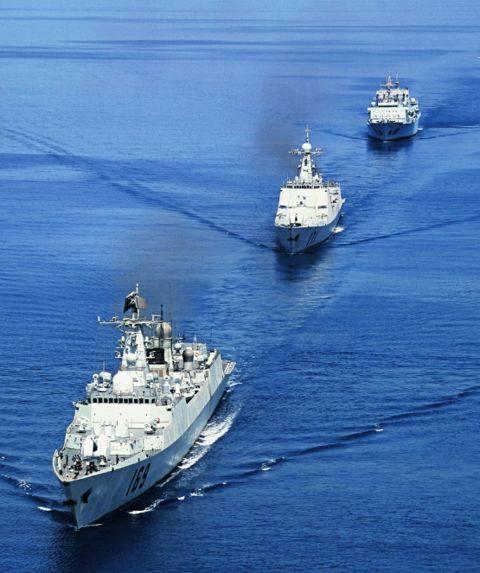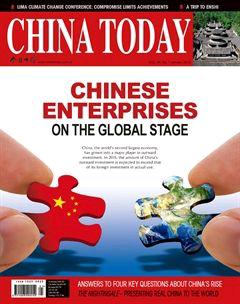China Must Participate in the Debate on World Order
By WU JIANMIN


WORLD ORDER, the book authored by 91- year-old statesman Dr. Henry Kissinger, who served as Assistant to the President for National Security Affairs and later concurrently as Secretary of State in the administrations of Presidents Richard Nixon and Gerald Ford, and whose opinion was subsequently sought by five U.S. Presidents, sparked a global discussion upon its publication in 2014, one that merits Chinas attention.
My diplomatic career included 10 years, over the 1970s and 80s, in the U.S., during which time I became closely acquainted with Dr. Kissinger. On my recent visit to New York he invited chairwoman of the NPC Foreign Affairs Committee Fu Ying and me to lunch. On presenting me with a copy of his new book he reiterated his view that the China-U.S. relationship is the key to world order.
There have been three extensive debates on world order over the past 40 years. The focus of the first, at the sixth special session of the United Nations General Assembly, was on the problems of raw materials and development. Convened in 1974 at the request of Houari Boumediene, then chairman of both the Revolutionary Council of Algeria and the Non-Aligned Movement, the session received strong support from developing countries, and is a significant event in UN history. Deng Xiaoping, who headed the Chinese delegation to the meeting, gave a speech elaborating Chinas stance and views on establishing a new international economic order. As a member of Chinas permanent mission to the UN, I was personally involved in the organization and convening of this meeting.
This special session was not unexpected, a series of incidents having set the stage for it. They began on October 6, 1973, with the breakout of the Arab-Israeli War. To express support for Egypt and Syria, the Arab oil-producing countries decided on October 17 to cut back on their production, and slapped embargos on oil exports to developed Western countries in protest at their assistance to Israel. Oil prices consequently soared from US $3.01 to US $11.65 a barrel in two months, so causing the worst economic turmoil in these countries since the end of WWII.
Imposing the sanctions taught developing countries a valuable lesson: that the raw materials and resources in their possession afforded them great power. Western countries dominated the world economic order in the 1970s, rigidly suppressing prices of raw materials and re-sources to serve their own interests at the cost of developing countries. State leaders and foreign ministers both debunked and rebuked this practice at the 1974 UN special session, arguing that Western colonialist deprivation, exploitation, and suppression were the root causes of poverty in the developing world. While witnessing the debate my impression was that of a third world indictment against colonialism. The meeting was heated and successful. Upon its conclusion the Declaration on the Establishment of a New International Economic Order and Program of Action on the Establishment of a New International Economic Order were adopted.
The sixth special session of the United Nations General Assembly constituted developing countries onslaught on the post-WWII world economic order. But its impact was limited due to the relative sparseness among the world total of developing economies. It therefore jolted the existing world economic order, but not to an extent that effected any great change.
The second famous debate on the world order occurred in the late 1980s and early 1990s, when the end of the Cold War created profound changes in the international situation, which, as Deng Xiaoping predicted, led to shifts in the world order.
During his meeting with a Japanese trade delegation on December 2, 1988, Deng said that it was time to establish a new international political order, for a new political situation had emerged where dialogue replaced confrontation and tension in the international arena was thawing. He proposed that the superpowers adopt the Five Principles of Peaceful Co-existence, and abandon hegemonic thinking. He remarked to Indian PM Rajiv Gandhi in their meeting on December 21, 1988: “The world faces two missions now – building a new world political order and building a new world economic order. I spent much time elaborating on the issue of a new international economic order during my 1974 speech at the UN. We have been talking about it since, and will continue to do so. As to the new international political order, I think the Five Principles of Peaceful Co-existence jointly put forward by China and India is the one that can best stand any test.”
On November 9, 1989, the Berlin Wall was brought down, marking Germanys reunification. Hot on its heels was the upheaval in Eastern Europe that culminated in the dissolution of the Soviet Union. The Western world, headed by the U.S., was of course both heartened and emboldened by these events. When addressing Congress on September 11, 1990, President George Bush said: “Out of these troubled times, our fifth objective – a new world order – can emerge.” In his State of the Union speech the next year he went further in this vein to say that the U.S. should play the leading role in building this new order.
At the proposal of the U.K. on January 31, 1992, the UN Security Council convened a meeting of heads of state in New York to discuss how to fortify the UNs status and function in the handling of international affairs. I was at that time director general of the Information Department of the Ministry of Foreign Affairs, and also the ministry spokesperson. I attended the meeting as one of a delegation headed by Premier Li Peng, who delivered a speech on Chinas stance on building new world political and economic order.
The Western elite were elated at the end of the Cold War and the collapse of the Soviet Union, which they saw as a victory. They were eager to project Western ideologies and practices worldwide and thus forge a new world order. The world, however, has always been diverse; making it monochrome is hence a pipe dream. The world has undoubtedly undergone changes since the end of the Cold War, but not in the manner the West expected. A number of developing countries have risen, bringing about a remarkable rebalance of international forces. The center of gravity of international relations is now shifting from the Atlantic to the Pacific region.
Dr. Kissingers new book probably triggered the third global debate on the new world order. In mid-October 2014, the Asia Society held a seminar in the U.S. on the rise of Asia and the shared future of humankind, to which Fu Ying and I were invited. Dr. Kissinger briefed us at the meeting on his opinions as expressed in his latest book, including that of the U.S. and China being the two indispensable pillars of the world order. He proposes that the two countries sit down to discuss construction of the 21st century world order.
Dr. Kissingers insight is admirable. He foresaw the rise of Asia, the strong growth of China and the scenario wherein the U.S. is no longer the sole dominant power in world affairs. In the making of a new world order, the U.S. and China, the worlds two largest economies, are naturally of utmost significance.
China must attach due importance to the current debates. Never in its millennia-long history has anyone ever approached China to discuss building a new world order. Over the past few centuries the West has formulated the world order without consulting the rest of the world. That it has now come to China to discuss the issue constitutes a sea change, attributable to Chinas remarkable development since bringing into effect its reform and opening-up policy. Chinas GDP in 1991 was a mere US $379.4 billion while, at US $6.17 trillion, that of the U.S. was 16-fold. In 2013 Chinas GDP rose to US $9.24 trillion compared with the U.S.s US $16.8 trillion – just 1.8 times that of China. Deng Xiaoping was hence absolutely correct in saying “development is of overriding importance.”
Fostering a new world order in the 21st century will be a gradual course. And a global debate is the first step. If China were to stay away from this debate it would waive its right to speak and so miss its chance to contribute to construction of the new order. Such irresponsible behavior would be inexcusable in the face of the world and succeeding generations.
It is time for the Chinese people to give serious thought to how to build the 21st century world order. I believe this mission calls on us to carry on the legacy of our late Chinese leaders Mao Zedong, Zhou Enlai and Deng Xiaoping, namely, the Five Principles of Peaceful Co-existence, which have stood the test of history. Deng once said that the new world political and economic order should be set on the basis of the Five Principles – advice we should follow.
But meanwhile we must be innovative under a new world situation. The most remarkable change in the global situation is that of the theme of the time – from war and revolution to peace and development. This change, overarching and sweeping, has hatched two worldwide trends. One is defined by peace, development, cooperation, and win-win results. And it is driven by two forces– unprecedented interdependence among humankind, and the grim, unforeseen challenges confronting it that threaten our survival, and which we can face only through joint efforts.
The other trend is that of Cold War thinking – confrontation, conflict, and hatred. It is also propelled by two forces – conventional mentality and interest groups. The zero-sum game has been played for thousands of years in human history, resulting in a conventional mentality that still influences peoples thoughts and deeds. Interest groups hanker for trouble, as they benefit from confrontation, conflict, and hatred.
In the course of building the 21st century world order, we must steadfastly follow the path of peace, development, cooperation, and win-win strategy, working to build a multi-layered community of common interest that covers multiple realms. This community, based on the confluence of interests of different countries, will increase interdependence of humankind. It hence offers a guarantee of world peace and common prosperity. Meanwhile, we must oppose the trend of Cold War thinking, confrontation, conflict, and hatred, in order to defend the interest of the Chinese nation and of humankind. I believe that only when the world jointly throws its weight behind the trend of peace, development, cooperation, and win-win strategy can we establish a new world order in the 21st century that contributes to lasting peace and common prosperity.

